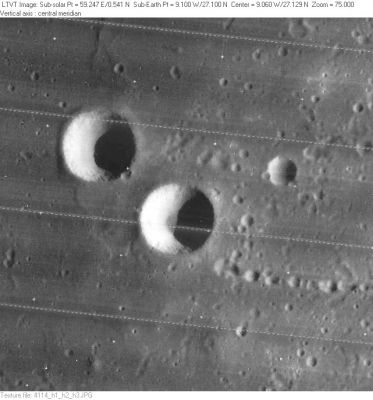Beer
Contents
Beer (and Fossa Archimedes east-southeast of it) ("Catena Beer")
|
Lat: 27.1°N, Long: 9.1°W, Diam: 9 km, Depth: 1.67 km, Rükl: 21 |
Lunar Orbiter IV-114H: Beer is at image center with the similarly-sized Feuillée to its upper left. The small crater to the upper right of Beer is Beer A. The chain of craterlets to the east-southeast of Beer was once known as Fossa Archimedes, but nowadays it is called Catena Beer by D.Caes.
Images
LPOD Photo Gallery Lunar Orbiter Images Apollo Images
Maps
(LAC zone 41A4) LAC map Geologic map LM map LTO map
Description
Description: Elger
(IAU Directions) BEER.--A very bright little crater, with an unnamed formation of about the same size adjoining it on the N., with which is associated a curious winding ridge that appears to traverse a gap in its N. wall.
Description: Wikipedia
Additional Information
Depth data from Kurt Fisher database
- Pike, 1976: 1.67 km
- Arthur, 1974: 1.65 km
- Westfall, 2000: 1.67 km
- Viscardy, 1985: 1.65 km
Nomenclature
- Named for Wilhelm Wolff Beer (January 4, 1777 – March 27, 1850), a banker and astronomer in Berlin, Germany. Beer built a private observatory with a 9.5 cm refractor in Tiergarten, Berlin. Together with Johann Heinrich Mädler he produced the first exact map of the Moon (entitled Mappa Selenographica) in 1834-1836, and in 1837 published a description of the Moon (Der Mond nach seinen kosmischen und individuellen Verhältnissen). Both remained the best descriptions of the Moon for many decades.
- Beer was Catalog Number 1185 in the original IAU nomenclature of Named Lunar Formations. The designation is attributed to Birt, and had earlier been adopted by Neison, 1876 (where the designation Beer A is used for what is now known as Feuillée, differing from the modern usage of Beer A for the much smaller crater selected in Named Lunar Formations). Schmidt is said there to have called this feature Hamilton (unrelated to the modern Hamilton) and to have used the name Beer for the crater now known as Rosse. However, Schmidt himself says that his personal preference since 1856, based on the Lohrmann maps (which he edited), was to call the present crater pair Beer and Mädler, but he changed these to Hamilton and Feuillée in his 1878 book in an effort to be consistent with the English observers.
- In his 1880 article, Neison equates Schmidt's 1878 Hamilton and Feuillée to his 1876 Beer and Beer A and the British Association's Beer and Mädler.
- The bracket joining the names on the index to an anonymous English map from the mid-1800's suggests, as does the bracket joining items 446 and 447 of Webb's list in his Celestial Objects (3rd edition), that the British Association regarded "Beer and Mädler" as a joint name for the present Beer and Feuillée, without distinction as to which was "Beer" and which was "Mädler", much as was done, for a time, with the two craters jointly known as Frères Henry. The name Mädler was subsequently assigned to a distant and unrelated crater. - Jim Mosher
Catena Beer (Fossa Archimedes)
- The officially unnamed chain of craterlets east-southeast of Beer and south of the modern Beer A is (unofficially) called Catena Beer by Danny Caes. It was once known as Fossa Archimedes (see Lunar Topographic Orthophotomap 41-A4). It is an interesting object to observe through common and large telescopes. It was frequently photographed during the mission of Apollo 15 (see orbital photograps at Images above, and also at Bibliography below).- DannyCaes Oct 20, 2015
LPOD Articles
Bibliography
Drawing and text by Alika Herring. S&T January 1966, p. 58.
APOLLO OVER THE MOON; A VIEW FROM ORBIT, Chapter 4: The Maria (Part 1), Figure 64.
APOLLO 15 FLIGHT JOURNAL, by David Woods and Frank O'Brien (orbital photographs of Beer/Feuillée and nearby Catena Beer).
